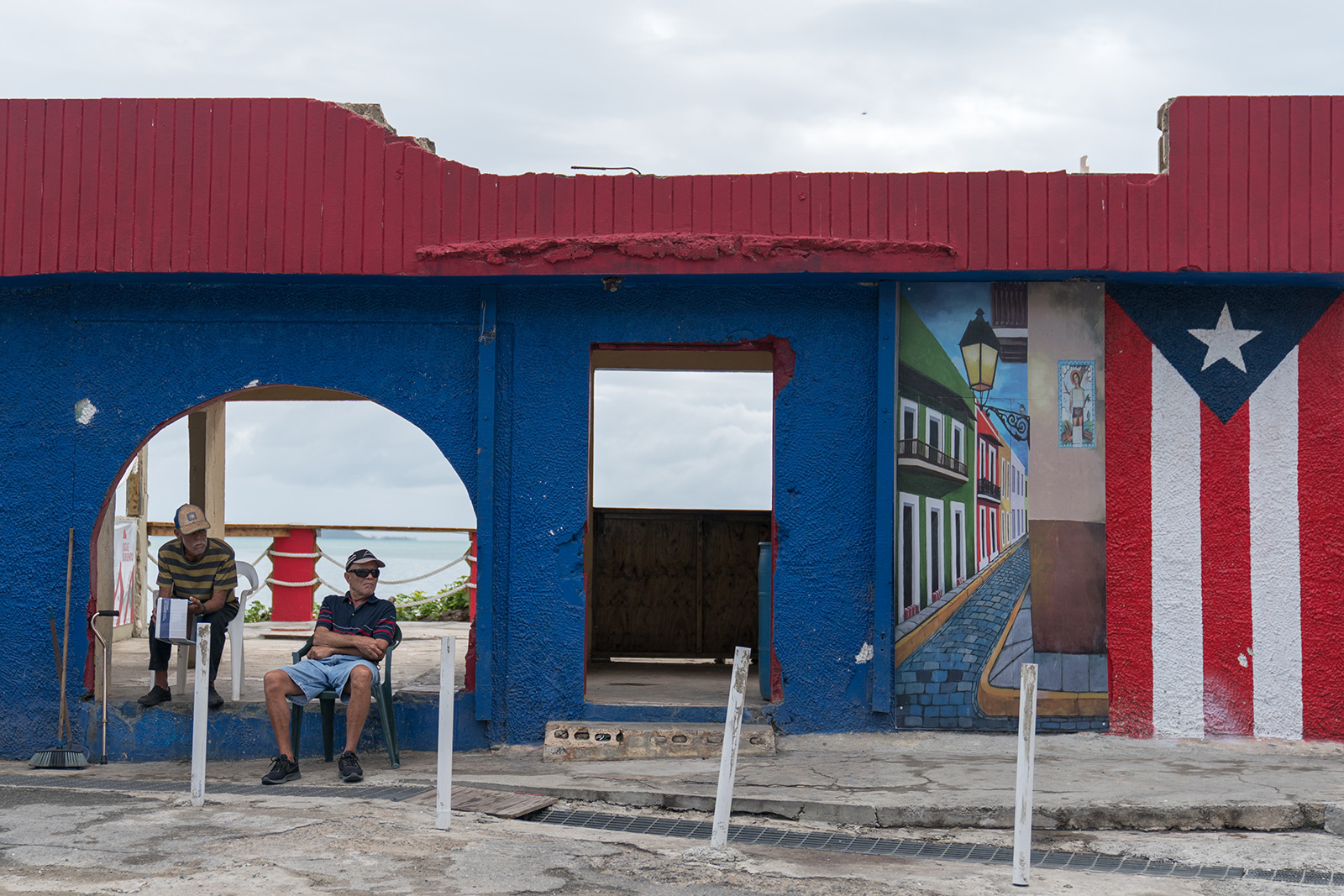
Puerto Rico’s nonprofits fear history repeating itself in homeless aid
Homeless providers in Puerto Rico fear that the history of federal emergency funding problems in the U.S. territory will continue with homeless aid provided by the CARES Act and impede their ability to care for those trying to survive the COVID-19 pandemic.
By Lidia Terrazas and Molly BohannonHoward Center for Investigative Journalism
Since the coronavirus pandemic hit Puerto Rico in March, many homeless relief organizations have been scrambling to meet the basic needs of the island’s homeless population because the majority of federal homeless aid that was allocated has not yet reached them.
Given the territory’s record of mismanaging disaster relief, homeless assistance and community development funds, fears are mounting that history may be repeating itself.
Under the Coronavirus Aid, Relief, and Economic Security Act passed in March, Puerto Rico was entitled to just over $39 million to help protect and shelter its homeless population during the COVID-19 pandemic. Nearly 70% of that total, or some $27 million, is supposed to be earmarked for smaller or rural communities, where a substantial portion of islanders are homeless.
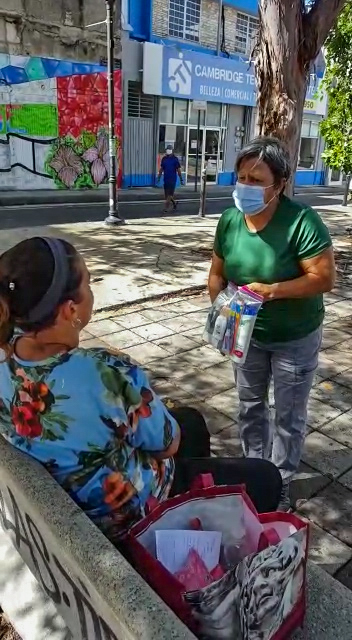
Puerto Rico officials didn’t tap the majority of their CARES Act funding until Oct. 27, according to an analysis of government spending data by the Howard Center for Investigative Journalism. That same month, territory leaders met with HUD officials concerned about Puerto Rico’s ability to successfully manage the unprecedented amount of aid. The $4 billion in homeless aid included in the CARES Act is about 14 times greater than the amount in last year’s Emergency Solutions Grants program. Grant recipients must have a HUD-approved use plan before accessing any of the aid money.
“Many of the funds have been slow in coming,” said Héctor Cordero-Guzmán, a professor at the City University of New York who studies poverty and economic development in Puerto Rico. “And there are lots of questions about whether aid has been getting to those that need it the most.”
Meanwhile, COVID-19 cases have been rising on the island. By early December, Puerto Rico had more than 52,000 confirmed cases — with 41,000 more suspected — among its 3.2 million residents. The infection rate among homeless people was unknown, but health experts say that group is at higher risk of contracting the virus because homeless people are generally in poorer health due to their living conditions.
Experts have predicted general increases in homelessness and poverty during the pandemic. In the last homeless census on the island, just over 2,500 homeless people were recorded, though experts say those numbers don’t reveal the true need. Providers estimate at any given time the real number of homeless people on the island is three times the number recorded in official data.
Yesenia Mojica Figueroa, who leads one of two HUD-designated homeless planning bodies in Puerto Rico, also said the methodology used to count homeless on the island focuses on the chronically homeless, not on those who are displaced, such as by natural disasters.
“We currently have a demographic that is living in unsuitable conditions that is not being counted,” she said.
Ariadna M. Godreau-Aubert, executive director of a San Juan-based legal aid group that works with homeless people, said the delays in federal CARES Act funding have created “dire circumstances,” and many who weren’t homeless are “now facing homelessness.”
Local mismanagement, federal distrust
Delays and mismanagement in aid programs are not uncommon in Puerto Rico.
Since 2007, inspector general audits have shown that HUD homeless and community development grants to Puerto Rico had been misused, unused or returned more than a dozen times. Highlighting compliance issues, these documents suggest that various Puerto Rican agencies tasked with managing federal aid have repeatedly failed to meet expectations.
In a 2009 audit, HUD said it “lacked assurance that … funds would be adequately accounted for, safeguarded, and used for authorized purposes.” In reviewing another aid program, HUD said in 2017 that Puerto Rico “did not report accurate information to HUD” regarding use of homeless aid.
In August 2019, HUD issued new guidelines for a disaster relief grant program that made clear its lack of faith in the territory’s government. The notice provided information about funding that was immediately available to several disaster-torn states and territories, but it said that Puerto Rico’s money would be withheld until a later date so that ongoing “governance and financial management challenges” could be addressed.
Following Hurricanes Maria and Irma in 2017, Puerto Rico was granted nearly $20 billion in community development disaster relief to help with recovery, especially in low-income areas. But more than two years after the hurricanes, only $1.5 billion of the community disaster relief had been disbursed, according to a February 2020 letter that 10 members of Congress sent the U.S. Department of Housing and Urban Development’s inspector general, questioning the delays.
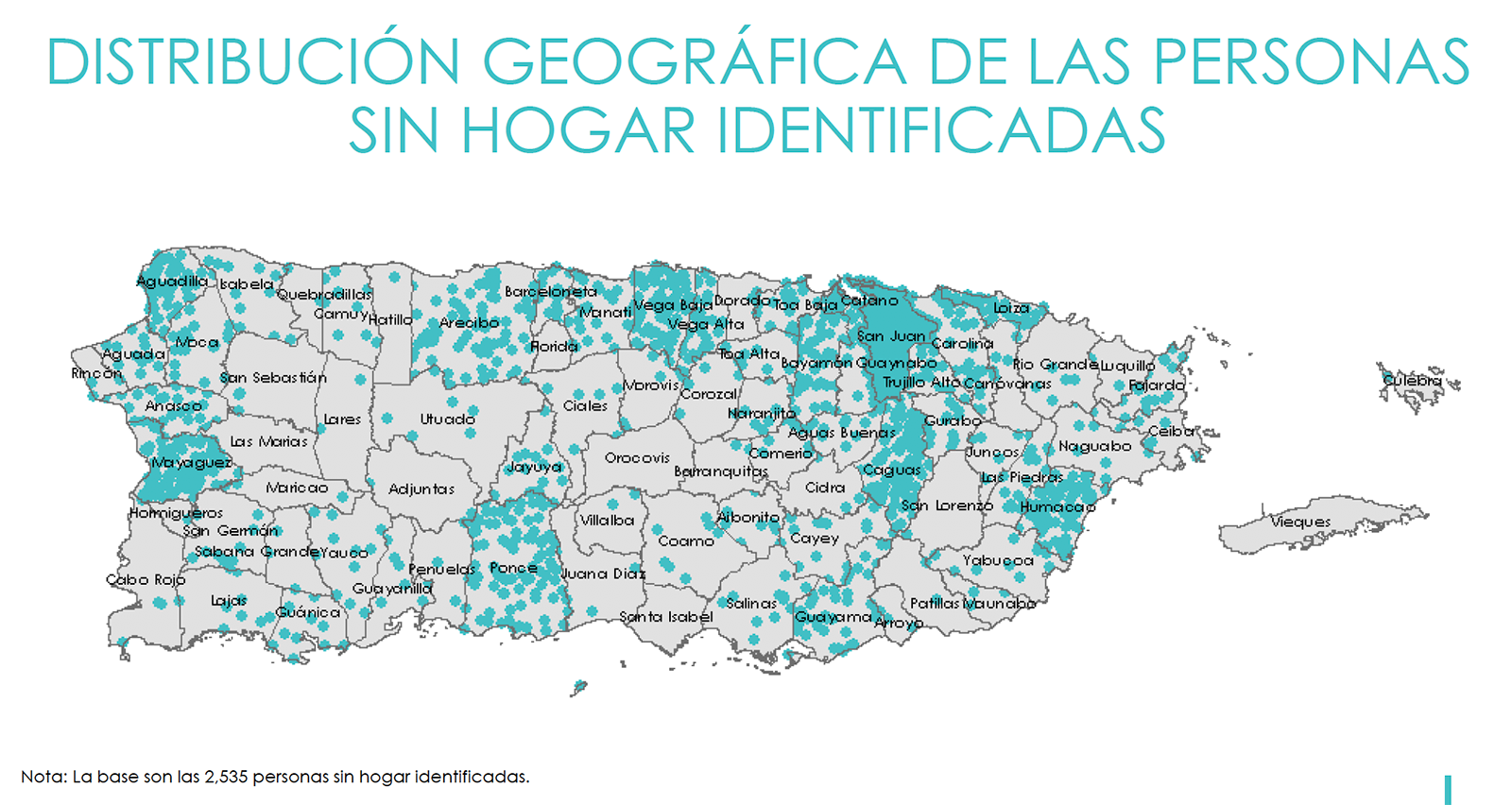
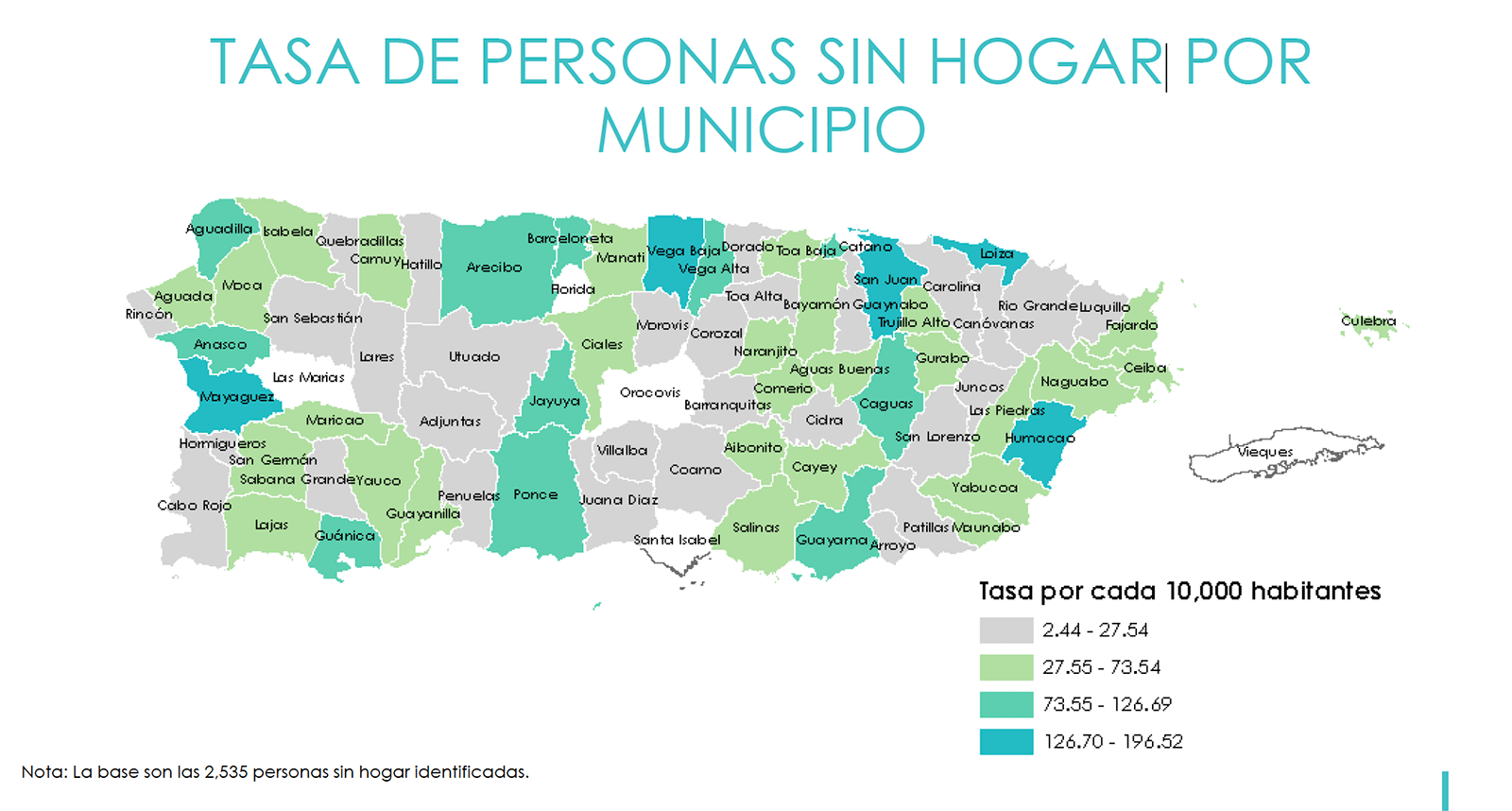
In a March 2020 audit of disaster relief funding administered by Puerto Rico’s Department of Housing, HUD’s Office of Inspector General admonished the department for not following procurement requirements and recommended it reimburse the federal government more than $50,000 and cancel more than $360,000 in planned spending.
A HUD official confirmed for the Howard Center that the federal government had recaptured an unspecified amount of unspent emergency homeless funds from 2013 from the Department of the Family, the same entity responsible for distributing the CARES Act funds.
When asked about the Puerto Rico government’s history of aid problems, the official said HUD staff had met in October with the secretary of the Department of the Family “to discuss concerns based on spending history.”
Secretary Orlando López Belmonte provided HUD with specific steps that staff from the Department of the Family was taking to ensure CARES Act funds are distributed quickly and in compliance with HUD regulations. Those included regular check-ins with agency and program staff “to identify and address issues as they arise” and the appointment of a senior staffer to oversee fiscal operations.
The HUD official provided information to the Howard Center only on the condition that she not be named.
López Belmonte declined repeated interview requests from the Howard Center to discuss the causes of the funding delays in Puerto Rico, nor did he answer written questions. On the mainland, several states and homeless services providers have blamed some of the delays on HUD, which didn’t issue guidelines on how the aid could be spent until Sept. 1.
“There's been calls for more transparency on the local government side, and more speed, agility, and efficiency on the federal government side,” said Cordero-Guzmán, the Puerto Rican scholar in New York. “And we need a combination of both.”
Delays and ‘brave organizations’
In mid-November, Puerto Rico’s Department of the Family put out a call to the island’s homeless service providers, asking for letters of intent describing where and how they might use federal aid. It was the first time since CARES Act funds were made available that front-line providers got an opportunity to make a pitch for funding.
Amid the delays, nonprofit aid organizations have had to turn to private donors to help with food, hygiene supplies and facilities, and coronavirus testing.
“What is happening is that there are brave organizations that have continued working with their existing funds,” Belinda Hill, executive director of Solo Por Hoy, said in late September. “But there are organizations that have stopped operating due to fear of COVID.”
Solo Por Hoy, a San Juan-based nonprofit that serves 24 municipalities on the island, continued to do what it could with the resources it had. Teaming up with other local providers, the organization led efforts to administer COVID-19 testing for homeless people on the northern part of the island. Hill said her group was able to fund nearly 1,000 tests before the private funds ran out in mid-October.
On a recent day in November, Carmen Romero Dones walked around San Juan’s Plaza de la Convalecencia, where homeless people gather, handing out hand sanitizer and other personal hygiene supplies.
Romero, the outreach worker for Solo Por Hoy, wore a face mask and held a yellow clipboard as she approached a woman sitting on a bench in the plaza. Handing her a bag of toiletries, including shampoo, deodorant and toothpaste, she assured the woman, “I'm going to follow up with you to see how I can continue to help you find a home.” A colleague filmed Romero’s outreach efforts for the Howard Center, which translated her conversation with the woman she called Angelique.
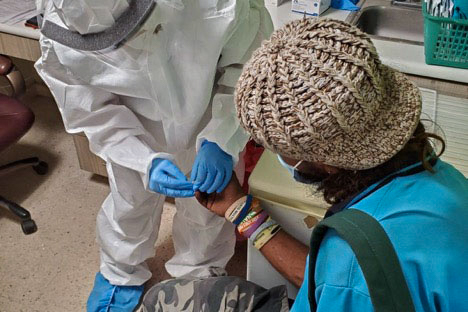
But in Vega Alta, a town of roughly 36,000 southwest of San Juan, nonprofit leaders like Lisdel Flores are worried. She said many organizations in smaller communities don't have the financial reserves to serve homeless people during the pandemic. Smaller communities account for 73 of the island’s 78 municipalities.
“The organizations have been the first line of defense, even when we lacked the resources,” Flores, executive director of the domestic violence shelter Hogar Ruth, said in a September interview.
Five big cities in Puerto Rico received $4.6 million of the nearly $12 million they had been allocated under the CARES Act last summer. The cities of San Juan, Bayamón, Ponce, Carolina and Caguas were entitled to receive direct funding from the U.S. government because of their size. Another $7 million in homeless aid is still available to these cities, according to the Howard Center’s data analysis.
But the Puerto Rico Department of the Family didn’t tap the majority of the territory’s aid — about $27 million — until late October. Typically, this type of funding is reserved for areas with fewer than 50,000 people, but the government is expected to make more than half of this money available to all communities, regardless of size.
As of early December, however, the department had not yet issued guidelines for the competitive application process to access the $15 million in aid, meaning funds may not be available to nonprofits working to help homeless people until 2021.
According to Puerto Rico’s spending plan approved by HUD, the government planned to spend its CARES Act funds on shelters implementing COVID-19 safety measures, such as non-dormitory-style shelter and isolation-quarantine units, rapid rehousing and homeless prevention activities, as well as administrative costs.

Further details on Puerto Rico’s homeless aid — such as when it will reach nonprofit homeless service providers — are unknown because officials in the Department of the Family declined repeated requests for interviews, and HUD would not release information on the territory’s plans. The governor’s office also did not respond to requests for comment.
“The federal government hasn't done all it can and should do to make sure that it understands and accommodates to Puerto Rico's unique circumstances,” said Cordero-Guzmán, the Puerto Rican studies scholar in New York.
“And the Puerto Rico government needs to be clear and transparent with who is getting the money, what they're getting the money for, what is the criteria for assessing and evaluating effectiveness,” Cordero-Guzmán said. “There's enough blame to go around.”
Reporters Anne Mickey and Helen Wieffering contributed to this report.
